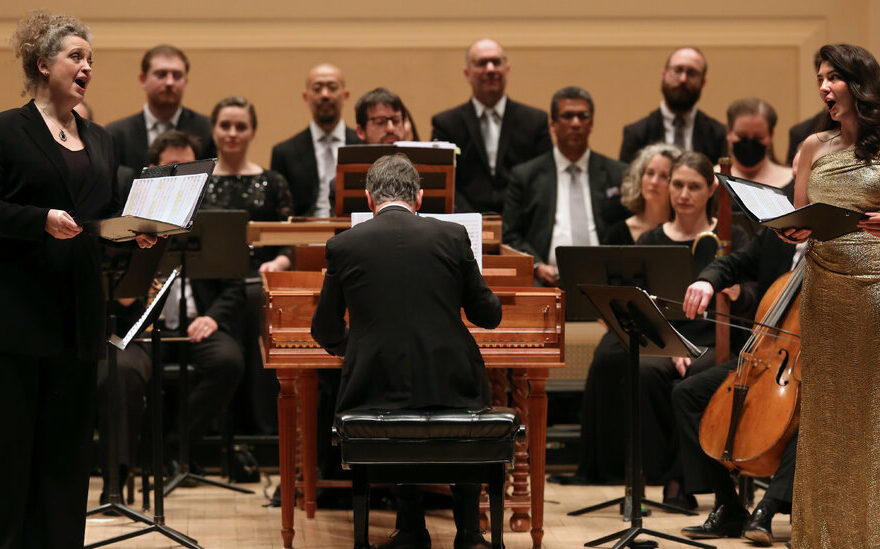“Swell the full chorus to Solomon’s praise,” a very full chorus sings in Handel’s “Solomon,” elegantly performed by the English Concert and Clarion Choir under Harry Bicket on Sunday at Carnegie Hall.
In the 1730s, as Handel’s London audiences gradually broadened into the middle class from the aristocracy, they lost much of their interest in his Italian-language operas, which had thrilled the cognoscenti for years.
And it turned out the public really wanted something that those aria-heavy operas didn’t provide: choruses. Lots of them — the grander, the better — along the lines of the monumental coronation anthems Handel had written for the crowning of George II in 1727.
This infinitely flexible composer obliged evolving tastes with a new genre. Handel had written “Esther” early in his career, but when he tried to produce it later at the theater where his operas were performed, clerics objected to the staging of a biblical narrative. So Handel presented the piece in concert form — accidentally inventing the English oratorio.
Generally sacred in subject, not meant to be staged, and organized as unruffled parades of tableaus more than sustained plots, these oratorios were at the time viewed as more populist than opera. Today, the reverse can seem true, with these stylized spectacles coming across as a bit remote, recondite and sturdy next to the naturalistic emotional urgency of the Italian operas.
More on N.Y.C. Theater, Music and Dance This Spring
But after Handel abandoned writing those operas, the 1740s were defined for him by oratorios like “Messiah,” “Hercules,” “Judas Maccabaeus” and “Semele,” which Bicket and the English Concert performed in 2019 as part of their richly rewarding Handel series at Carnegie. “Solomon,” from 1749, was the ninth installment in 10 years.
There is no real story here, just a few episodes from the biblical account of wise King Solomon: a celebration of the temple he built in Jerusalem; his happy marriage to one wife (not the hundreds described in Scripture); his savvy adjudication between two women, each claiming to be a newborn’s mother; a court visit from the Queen of Sheba.
Handel stretches and fleshes out these anecdotes into a calmly gleaming edifice of ocean-liner size and stability. It’s no surprise that he became so closely identified with English ceremonial splendor; when you think of the teeming yet glacial, serene yet stirring pageantry of royal weddings, funerals or coronations, you’re thinking of the style and pace of Handel’s oratorios.
None is more sumptuous than “Solomon” — most of its choruses are scored for eight voice parts, versus the standard four — but on Sunday, Bicket emphasized intimacy, delicacy and restraint. It was clear from the overture that lyrical gracefulness was the aim here. With tempos moderate and textures silky throughout, there was no attempt to supercharge contrasts or inflate the drama, just a sense of letting the piece speak for itself.
And of letting the chorus shine. The Clarion Choir, directed by Steven Fox, was superb in the score’s many moods: the stout “Your harps and cymbals”; the hovering mist of “With pious heart”; the fragrant “Nightingale Chorus” (“May no rash intruder”) at the end of Act I. Even in the stentorian “From the censer curling rise,” the group had an airy sound, artfully balanced — and blending — with the orchestra.
In “From the east unto the west,” there was a sense of vast fields of tone, shifting and overlapping, and the Clarion forces rose to the great sequence of Act III: gentle, then intense, then stark, then gauzy. (Bicket, like many conductors, chose to end the oratorio with the moving chorus “Praise the Lord” rather than the more playful “The name of the wicked.”)
Those used to the dazzling solo virtuosity of Handel’s operas may find the aria parts in “Solomon” a tad sedate. Only the tenor role of Zadok the Priest is heavy on ornamentation, handled gamely if without glitter on Sunday by James Way.
Bicket cast sweet, slender voices — articulate but mellow — ensuring no singer stole attention from the chorus and orchestra. As Solomon, the mezzo-soprano Ann Hallenberg (a favorite of Baroque connoisseurs, too little heard in New York) was eloquent; the soprano Miah Persson was dignified as Solomon’s queen and as the victor in the baby-splitting trial. Their duets had tender lightness, a watercolor’s fresh paleness.
As the villainous second mother-claimant, the mezzo-soprano Niamh O’Sullivan was potent. The soprano Elena Villalón offered a pastoral farewell as the Queen of Sheba. The role of the Levite sometimes pushed the robust bass-baritone Brandon Cedel colorlessly low in his range.
With instruments and choir dominating, this “Solomon” was more refined than immediately vivid — understated even amid all the score’s pomp. With sensuous yet lively strings, the English Concert offered poised playing throughout, even on difficult-to-control period woodwinds and brasses. (“Solomon” is contemporaneous with Handel’s similarly blazing “Music for the Royal Fireworks” suite.)
The honeyed tone of the small complement of continuo instruments as the competing mothers approached Solomon was just one example of the care taken with details. Led with subtlety and patience by Bicket, the performance, in the libretto’s words, let “sweetly flow the lulling sound.”
Solomon
Performed on Sunday at Carnegie Hall, Manhattan.
Source: Read Full Article
